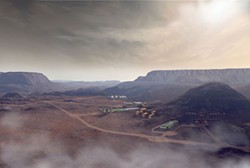[
{
"name": "Top Stories Video Pair",
"insertPoint": "7",
"component": "17087298",
"parentWrapperClass": "fdn-ads-inline-content-block",
"requiredCountToDisplay": "1"
}
]
The Martian, playing in 3D at a theater near you, is Ridley Scott's attempt to show how a castaway on Mars (Matt Damon) could "science the shit" out of his predicament and survive long enough for a rescue mission to reach him. Scott is the man for the job, having previously directed such fabulous futuristic yarns as Blade Runner and Alien. His vision of Mars (actually, Wadi Rum in south Jordan) is quite believable.
Almost. It's a movie, so something has to give. Director's license allowed for several obvious boners (minimal spoilers ahead):
Mars atmosphere being 1 percent as dense as Earth's, a fierce windstorm would have very little practical effect, other than raising a lot of dust.
Martian surface gravity is 38 percent that of Earth, so astronauts would probably be shuffling and hopping, rather than just walking.
Mars receives only 50 percent of the sunlight we do, so the landscape would appear much gloomier to our eyes.
Damon's character plausibly obtains water from hydrazine rocket fuel brought to Mars from Earth, but he'd have found it a lot easier to bake water out of the ground beneath his feet. (Two years ago, NASA's Curiosity rover found 2 percent water by weight in Martian soil — equivalent to a quart per cubic foot of dirt.)
On the plus side:
The marooned astronaut probably could grow potatoes in feces-enhanced Martian soil (although it's unlikely the crew would have brought actual spuds, let alone ones that sprouted).
Powering up the old Pathfinder/Sojourner hardware for communication is pretty cool.
The huge mothership, with a rotating wheel for artificial gravity, is the sort of craft that might one day shuttle endlessly between Earth and Mars. (In the 2035 timeline of the movie, though, that would be like Columbus waiting for the QE2 to be built before sailing to the New World.)
Saving the worst for last: Oddly, for a NASA-endorsed movie, the agency's director (played by Jeff Daniels) is caricatured as a know-nothing buffoon. First, he orders a communications embargo on telling the returning crew they'd inadvertently left one of their number alive on Mars, even though everyone on Earth knows. (Right now, the ISS crew has access to direct email communication with anyone they choose.)
But mainly, in a Just Plain Dumb plot device, this director guy is utterly ignorant of orbital mechanics. "Would it work?" he asks, "it" being the notion of looping the homeward-bound craft around Earth, whirling it back to Mars on a rescue mission. True, in 1962, when UCLA math graduate Michael Minovitch, working as a summer intern at JPL, proposed the notion of "gravity assist" (swinging a spacecraft close by a planet in order to change its course and accelerate it), it was greeted with skepticism. But that was then, and NASA has been successfully using gravity assist since 1973: it's a proven, well-known technique. For the director of NASA to ask if it would work would be like a brain surgeon asking an assistant where the corpus callosum was.
For that matter, there is no director of NASA — it has an administrator, ex-astronaut Charles Bolden. Bet he knows all about gravity assist. I know, I know, it's a movie. I should let it go.
OK, deep breath. Overall it's a great romp. Three stars.
Barry Evans ([email protected]) believes that one-way Mars missions are the way to go (life being a one-way journey anyway).
more from the author
-
The Myth of the Lone Genius
- Jun 6, 2024
-
mRNA Vaccines vs. the Pandemic
- May 23, 2024
-
Doubting Shakespeare, Part 3: Whodunnit?
- May 9, 2024
- More »


































